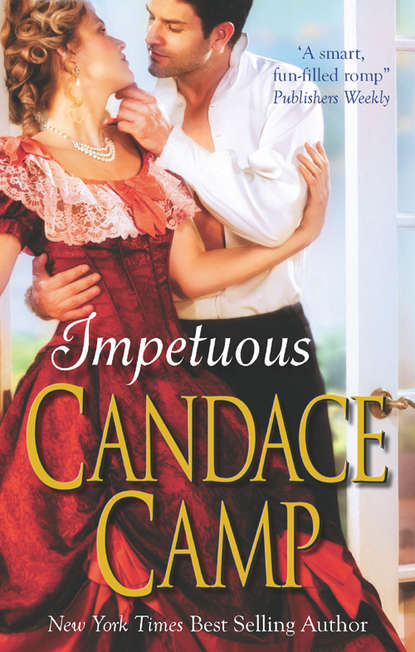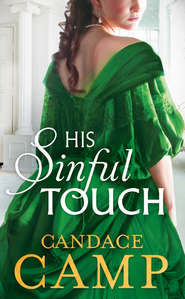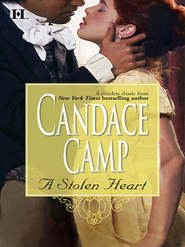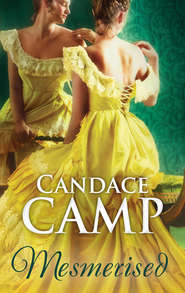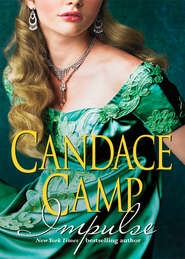По всем вопросам обращайтесь на: info@litportal.ru
(©) 2003-2024.
✖
Impetuous
Настройки чтения
Размер шрифта
Высота строк
Поля
“Well, hmm...I suppose we must see him, Soames.”
As soon as Soames was out the door, Aunt Ardis turned toward Cassandra. “An imposter?” she suggested. “An American claiming to be a relative of yours?”
“I suppose someone in the Verrere family could have emigrated,” Cassandra mused, frowning.
“No doubt he thinks that Chesilworth, just because he has a title, is a wealthy man. He’s hoping to get money out of you, mark my words.”
“He will be mightily disappointed, then,” Cassandra remarked cheerfully.
A moment later Soames reentered the room, intoning, “Mr. David Miller.”
A young man followed him into the room and paused, smiling tentatively at the three women who sat there. He was in his twenties, with sky blue eyes, a thick mop of blond hair and a rakish mustache, which Cassandra suspected he had cultivated to age his boyish countenance. He was dressed fashionably, but not glaringly so, and Cassandra judged him to be a respectably handsome man. Her opinion was confirmed by the sudden flare of interest in Joanna’s eyes.
Mr. Miller bowed to them. “Please pardon my intrusion. I know I should have written to introduce myself, but when I found myself in London with unexpected time on my hands, I was seized by the urge to meet my British cousins. I hope you will not think me overly bold.”
“Pray sit down. I am Miss Cassandra Verrere,” Cassandra introduced herself. “My brother is Lord Chesilworth, but I am afraid he is still only a lad. This is my aunt, Mrs. Moulton, and her daughter, Miss Joanna Moulton.”
The young man bowed over each of the ladies’ hands politely before taking his seat. “It is the Verreres to whom I am related—quite distantly, of course,” Mr. Miller explained eagerly. “One of my ancestors was a Verrere. She and her husband settled in Boston, oh, almost two hundred years ago.”
“What?” Cassandra stared. “But what—what was your ancestress’s name?”
“Margaret Verrere. Family legend has it that it was a most romantic affair—she eloped with a man of common birth, and they fled the wrath of her family to the colonies.”
“I cannot believe it.”
“Oh, ’tis true,” David Miller assured her earnestly.
“No, I did not mean that I don’t believe the story about Margaret Verrere. It is just that—well, it is so astonishing. You see, I have been reading her journals.”
He grinned. “Splendid. I hope you enjoyed them. I am the one who sold them to Mr. Simons. I am a merchant in Boston, and every once in a while I come to London to make purchases, see the latest things, you know. Last year I decided to bring Margaret Stone’s journals—that was her married name, you know—to London and sell them. I sold them to a bookseller named Simons. This year, when I went by to see him, just to renew the acquaintance and see whether he had sold the journals, he told me that Lord Chesilworth, a Verrere himself, had bought them. I was most pleased to hear that they had found their way back to their proper family. Of course, I realized that we must be distantly related, and, well, when I had some free time on my hands, I felt that I must make your acquaintance.”
“I am so glad that you did.”
Joanna, who had lost most of her interest in the handsome young man when she learned that he was a mere merchant from Boston, was even more bored by this talk of books and ancestors. Properly, this young man, whatever his reasons for coming to Dunsleigh, should have been so captivated by her beauty that he talked of her, not musty old journals and dull relations. She stirred restively in her seat.
“Wonderful.” Mr. Miller beamed. “I was afraid that you would find me too presumptuous. I find that the English often seem to find Americans so.”
“I am very glad to meet you. I find Margaret’s story fascinating, as did my Papa. It is he who was the Lord Chesilworth who bought them from Mr. Simons. But I am afraid that Papa passed away several months ago. He would have been so delighted to meet you. He would have had many questions about the journals.”
“Must we talk about books, Cassandra?” Joanna asked plaintively.
“I am sorry, Miss Moulton.” Miller favored her with a smile. “Indeed, no doubt you found it boring, hearing two people talk about their relatives. I take it that you are not a descendant of Margaret’s family.”
“I haven’t the faintest idea who Margaret is,” Joanna said with a little giggle that more than one swain had assured her was delightful.
“No, my cousin and aunt are not Verreres,” Cassandra explained. “We are related on my mother’s side.”
“I see.”
“But tell me, Mr. Miller, pray, how did you come upon the journals and why did you decide to sell them?” Cassandra wished that Sir Philip Neville were here now to hear the full story of the journals. He had been so certain that poor Mr. Simons had played them false—perhaps Mr. Miller could put his mind to rest about the journals’ authenticity.
“My mother died almost two years ago. It was through her that I was descended from Margaret Verrere Stone. My grandmother, her mother, had been very interested in the family history, and she had preserved many old family records—family Bibles, birth and death and wedding certificates. Anyway, she had several trunkfuls of such things, which my mother had merely stored in the attic. But then, when my mother departed this world, I was going through her things, and I came upon my grandmother’s trunks. They were stuffed with old family relics, most of which I decided to get rid of. Among those things were Margaret’s journals.”
Glassy-eyed by now, Joanna seized the opportunity of a pause in Mr. Miller’s recital to say, “Perhaps you could show Mr. Miller the garden, Cassandra. Americans are always interested in English gardens, aren’t they?”
“I am sorry, Miss Moulton. I fear I am boring you with such talk. It is just that I am so thrilled to be meeting a, well, a sort of cousin, I suppose.”
“You are right, Cousin Joanna.” For once, Cassandra thought, her cousin’s wishes and her own coincided. It was always difficult to carry on a serious conversation with Joanna around, flirting and simpering and determined to keep the conversation on the one thing that truly interested her, herself. “I would be pleased to show Mr. Miller the garden. Would you care to continue our conversation there, sir?”
He agreed with alacrity, and Cassandra led him out into the formal garden behind the house. He courteously admired the various roses, delphiniums and daisies, and then he and Cassandra settled down on the bench in the grape arbor.
“Tell me the rest of it,” Cassandra urged. “Did you read Margaret’s journals? Why did you decide to sell them?”
Miller’s blue eyes twinkled. “No doubt you will consider me a crass American, Miss Verrere, but the truth is, I have little interest in books or in searching out each twig of the family tree. I found it rather intriguing to learn that there were still Verreres here in England to whom I was distantly related, but as for studying the family history—well, I’m afraid I haven’t either the time or the inclination.” He gave her a small, self-deprecating smile.
“That is perfectly understandable. I don’t expect everyone to share my interests. So you did not read the journals?”
He shook his head. “Not really. Oh, I glanced through them, but I read very little. I didn’t know what to do with them at first. I hated to throw them away. I mean, they were so old, and I thought they must be valuable to someone. Finally one of my friends suggested that I sell them in England the next time I went. He pointed out that the English were, in general, more interested in history. He thought it would be a perfect market for old books, especially since Margaret came from here and doubtless left family behind. So I took his advice and brought them with me on my last trip to London. There, as I said, I sold them to Mr. Simons.” He smiled and added, “Actually, I tried to sell them to several book dealers, but Mr. Simons was the only one who wanted them.”
“I am so glad you did,” Cassandra told him warmly. She found herself liking Mr. Miller. He was open and direct in a way that most people never were. She wasn’t sure if it was simply an American quality or an attribute of this man. Whatever it was, she found that she could not keep from smiling back at him whenever he smiled. He was also, she thought, quite handsome—better looking, in fact, than Sir Philip Neville.
“My father was thrilled to actually get to read Margaret Verrere’s words,” she continued. “Her history—the elopement—had been a particular interest of his.”
They continued to talk for some time. He was interested in Margaret Verrere’s family, his relatives, and what had happened to them in the years since Margaret eloped. When Cassandra told him that the home in which Margaret had lived was still standing and had indeed been Cassandra’s own home until her father’s death, he was struck with awe and asked her if he might see it.
Cassandra was quite happy to show Chesilworth to him, and they went that afternoon, accompanied by the twins and Olivia, who always welcomed any excuse to get away from their aunt’s house. The twins, of course, peppered David with questions about the United States as well as the ship on which he had come to England, but he answered them all with great patience.
“Are you going to hunt for the treasure with us?” Hart asked with excitement when they reached Chesilworth.
“The what?” He looked down at the boy, startled, then over at Cassandra.
“The dowry,” Hart went on impatiently. “You know. Margaret’s dowry.”
“He’s talking about something in the journals,” Cassandra explained, adding to her brother, “Mr. Miller did not read the journals.”
“There is a treasure mentioned in them?” The American looked intrigued.
“It tells how to find it,” Crispin told him, and the two boys began to eagerly explain the existence of two maps. “One is in a letter. That’s what we are looking for in the house. The other belongs to Sir Philip, but he refuses to help us, so we are going to have to figure out how to do it ourselves.”
“A treasure hunt!” David Miller exclaimed. “How delightful. I am sorry that I cannot stay longer and help you with it.”
“Yes, that would be bang-up,” agreed Hart, who, along with Crispin had liked their American relation from the moment they met him.
“Why don’t you stay?” Crispin suggested. “Couldn’t he stay, Cassie?”
“He might not be able to, boys. Don’t plague Mr. Miller.” She turned to the man with a smile. “If you were able to stay, though, we would greatly enjoy it.”
“You tempt me.” He sighed. “But I do have business in London that I must get back for. And my ship home sails in a week.” He looked torn for a moment, then shrugged and said, “Well, perhaps I could stretch my stay to a second night.”





